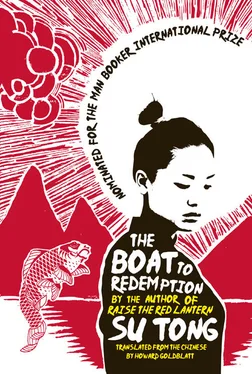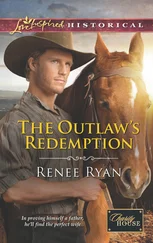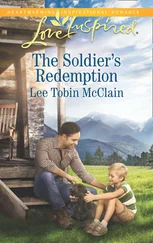As dawn was breaking I was in the middle of a dream about the river and our boat. I could hear the churning of the water off the fantail, creating transparent bubbles. Our anchor was banging against the hull — once, twice, three times — and in the wake caused by our passage, an old-fashioned woman appeared, translucent pearls of water dripping from her hair, which was cut short; drops of water shimmered on her face, and the same secret message emerged from her reddened lips: Come down, come down, come down now . The fact that I was dreaming did nothing to lessen the reverence I felt towards her. I held my breath so I could hear her clearly: Come down, come down, come down now . The martyr was holding on to the swaying anchor, which caused the barge to roll from side to side. Come down, come down, come down now . She was so close I could see moss growing on the backs of her hands. I stared in awe at her face and at her hair as it swished back and forth above her ears. Watery pearls fell into the river and revealed the anxious face of a mother. Come down , she said, come down. You can both be saved .
That startled me awake. The cabin was suffused with soft blue early-morning light. Day was breaking. I got up and went to the door to look outside. Father was still keeping watch over the memorial stone. Two of the lanterns hanging from the canopy had gone out. As I went on deck I was hit by the potent fishy smell of Father’s body. His head was resting against the stone, a homemade plywood chessboard on his knees. A few of the chess men remained on the board; the rest were scattered on the deck around him.
Father was half asleep, his forehead furrowed with shadows whose origins were a mystery. ‘Dongliang,’ he said, ‘can you hear that strange sound coming from the river?’
I didn’t dare tell him about my dream. ‘Your hearing isn’t as good as it once was, Dad,’ I said. ‘That’s the anchor hitting the hull.’
‘No,’ he said, ‘not the anchor. Actually, it’s not really so strange. The river is saying, Come down, come down .’
I lifted him to his feet to force him to go inside, but he pushed me away. ‘There’s no time to sleep, they’ll be here soon.’ He pointed to the shore, where people were beginning to stir. An odd smile floated on to his face. ‘The sun’s out, and they’ll be here soon. The battle over the memorial stone is about to start.’
I was puzzled by his casual tone and his smile, and wondered if he had passed a sleepless night reminiscing or planning for what was to come. Daylight filled the sky, and the piers were waking up. The PA system crackled to life, blaring a choral work that extolled the virtues of the labouring masses. ‘We workers have power as we work, day and night.’ From the mountain of coal to the oil-pumping station, machinery that had slept through the night awakened, motors roaring. Cranes in the dock area creaked and moaned as their arms limbered up, skip cars emptied their loads of bags of cement, which thudded on to the open ground, sending sand up into the air, only to settle to the ground like falling rain. Chunks of coal complained shrilly, like the shrieks of women, as they landed, while boulders roared like rocky avalanches. I saw a strange tubular oil tower, formed, thanks to the morning light, into what appeared to be a blue metal stage. Birds circled it. Why, I didn’t know, but flocks of sparrows had flown over Maple Village, on the far side of the river, and brazenly gathered on top of the tent, where they filled the air with a chorus of mysterious, shrill cries, competing with the PA system.
They came, just as he’d said.
Four men were the first to arrive: Wang Xiaogai, Scabby Five and Baldy Chen of the security group appeared on the embankment, along with the head of the Milltown police department, all of them looking very businesslike. I saw that Baldy was holding his rifle, a glinting bayonet in place. Without a second thought, I ran over and pulled up the gangplank. Scabby Five saw what I was doing and dashed up, but found nothing but empty air. ‘Kongpi,’ he growled, ‘where did you get the guts to steal Deng Shaoxiang’s memorial stone? Why the fuck don’t you go to Tiananmen Square and steal the Monument to the People’s Heroes?’
No time to reply. I picked up our axe and attacked the mooring hawser. Running away is always the best strategy; we had to get the boat away from the pier. ‘Dad,’ I shouted towards the canopy, ‘we have to get out on the river!’ Then I grabbed our punting pole, which we hadn’t used in years — with no tugboat, that was our only means of getting going. We moved four or five metres away from the pier under the helpless stares of the four men, who began arguing about how to get on our boat. Scabby Five, first again, took off his shoes and rolled up his trouser legs, planning to wade over to us. ‘Damn, this water’s cold!’ he groused. ‘And where did those little whirlpools come from?’
‘Don’t talk like an idiot,’ Wang Xiaogai said. ‘How can there be whirlpools so close to shore? You ought to be brave enough to walk in water that shallow.’
But Scabby Five was having none of it. ‘It’s cold and it’s deep,’ he said, ‘and the air pump is sucking my legs down. You’re the leader of this group, the one who’s supposed to be so brave, why don’t you come down here?’
Xiaogai, not about to take the bait and having no luck with Scabby Five, turned his attention to Baldy Chen. ‘That’s a rifle you’ve got, not a fishing pole, so shoot.’
If I hadn’t been afraid before, I was now. I crouched down and waited. Nothing happened. Then I heard Baldy say, ‘Shoot what? You need bullets for that, and they wouldn’t give me any.’
‘Kongpi! What a stupid arsehole! Go on, try to run away,’ Xiaogai shouted to me. ‘The river won’t help you. The Golden Sparrow doesn’t belong to you, and how far do you think you’ll get with a punting pole? You could punt all day and still be in Milltown’s waters. Even punting for a whole month and getting off the Golden Sparrow won’t do you any good. One phone call to alert the emergency defence forces, and you’ll fall into our hands. But go ahead, try, maybe you’ll make it to the Pacific Ocean! But not to the Atlantic. Or maybe you’ll reach the shores of the American imperialists. Well, so what? We’ll fire a missile and wipe you off the face of the earth!’
Police Chief Xiao remained calm the whole time. He knew what to do. Rolling up a magazine to serve as a makeshift megaphone, he stood on the riverbank and shouted, ‘Barge number seven, Father and Son Ku, be warned. Seizing a revolutionary historical relic is a crime. If you don’t want to be guilty of a crime, come back to shore. Turn back and the shore is at hand.’
We weren’t about to turn back, because the shore was theirs, not ours. The battle for the memorial had begun. I felt a great sense of urgency. For all my eleven years on the water we’d plied the river behind a tug boat, and punting was something I’d never done. But I tried my best, pushing with all my might until I was bent over the fantail, and then walking towards the prow. That’s how other people did it. But the barge refused to cooperate. When I walked, it stayed stubbornly where it was, lying perpendicular to the shore and trying my patience. ‘Go over to the starboard side!’ Father yelled. ‘Get over there!’ I dragged the pole over to the starboard side, but unfortunately that didn’t work either. Father, who didn’t know a thing about punting, was giving me useless commands. Then the boat began to move — floating back towards the shore! ‘Now go back to the port side!’ he shouted. So there I was, running helter-skelter from port to starboard, to the uproarious delight of the men on shore.
Читать дальше












